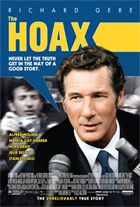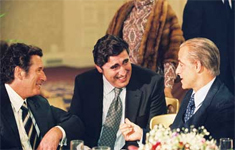The Hoax
| “Well, this must go down in history. I only wish I was still in the movie business because I don’t remember any script as wild or as stretching of the imagination as this yarn has turned out to be.”
In the early 1970s, Clifford Irving and his writing partner Richard Susskind very nearly pulled off a scheme so brazen that it still has the power to make jaws drop: they convinced a major New York publishing house to advance them $860,000 to publish an authorized autobiography of reclusive billionaire Howard Hughes even though neither man had ever met or spoken with Hughes in any way. Irving was convinced that, because Hughes hadn’t been heard from in nearly a decade (some people were theorizing he was already dead) that he wouldn’t come out of seclusion to denounce the book. Director Lasse Hallström clearly wants Irving (Richard Gere) to come across as a sympathetic protagonist, despite some of the personal and emotional damage he inflicts on others to maintain his own self-interests. At his worst, Irving tricks Susskind (Alfred Molina) into committing adultery in order to keep him working on the book, an event the real-life Irving dismisses on his web site as an outright fabrication and one that he considers defamatory. Of course, someone who fabricated someone else’s autobiography denouncing others for taking liberties with his own life story is an irony in and of itself, suggesting that the layers of this particular onion could be peeled back into infinity. The Hoax moves steadily and methodically through Irving’s scheme, from his bold pitch to the editors at McGraw-Hill, to his forging letters from Hughes based on handwriting samples he had seen in Newsweek, to the research he and Susskind conducted, which results in more than a few suspenseful scenarios in which poor Susskind, who often plays the fool to Irving’s conniving maestro, ends up doing the dirty work of slipping away during a meeting to photocopy someone else’s memoirs or, in the film’s most memorable scene, putting top-secret military files down his pants and walking out of the Pentagon with them. All of this is pure movie exaggeration, and it works on its own level even if the film as a whole clearly misses a golden opportunity to use Irving’s story as a reflection of the movie biopic’s own nature, which is to rework the “facts” in a way that best suits the filmmaker’s desire. There will be, and already has been, much discussion about the differences between The Hoax’s account of what happened and Irving’s memoir about the events, which was originally published in 1972 and then reprinted under a different title in England in 1981 (it is, of course, now readily available as a movie tie-in paperback with Richard Gere on the cover). It is telling that Irving opens his book with a quote from Jean le Malchanceux about the pointlessness of searching for motivation: “the attempt to establish relationships between acts and motives, effects and causes, is one of the most time-wasting games ever invented by Man.” If you’re not familiar with Malchanceux, don’t feel bad because he doesn’t exist--he’s a fictional creation Irving borrowed from the writers on the island of Ibiza, where he lived when he wrote the Hughes autobiography (the film shows him living in upstate New York, a budgetary concession that results in Irving being depicted as much more typically middle-class than he actually was). If Malchanceux’s admonitions about motives and causes be true, then The Hoax is two hours of wasted time because much of its emotional energy is invested in explaining why Irving perpetuated what he describes as his “gorgeous literary caper.” At first, it appears to be a combination of both monetary desperation and revenge on McGraw-Hill for declining to publish his most recent novel. But, once Irving begins work on the project, it seems that it is the very allure of his deception that intoxicates him and keeps him going. Some of the film’s best scenes involve Irving literally becoming Howard Hughes, with slicked back hair, pencil mustache, and Texas drawl, as he records fake interviews for his project; it is here (and only here) that the film flirts in any meaningful sense with that dangerous line between willful fakery and losing oneself in the charade. Once Irving stumbles across secrets involving the Nixon White House and others in political power, he becomes convinced that his ruse has turned into what he originally sold it to the publishers as: the most important book of the 20th century. Yet, the true key to Irving’s misadventure, and the one that never finds its way into The Hoax, is stated clearly by Irving himself in Orson Welles’s 1974 documentary F for Fake: “Everybody loves to see the experts and the establishment made a fool of.” In saying this, Irving was talking about the great art forger Elmyr de Hory, about whom Irving had written a book titled Fake! in 1969, but considering that he had already perpetrated the Hughes hoax at the time, he could just as well have been speaking about his own endeavors because that is precisely what he did: he fooled the powerful editors and publisher of both McGraw-Hill and Life magazine, which paid record sums to serialize the book; handwriting experts; journalists who had known Hughes; and possibly even members of Hughes’ own organization. In other words, his scheme was really about undercutting the establishment on their own terms. The Hoax shows all this, but only a surface level. There is a sense of exhilaration in Irving’s calculated brilliance, but the film hinges it first on Irving’s desire for money and then later on his own deluded self-importance. Hallström hints at the essence of the con--that those being conned allow themselves to fall for it because in some way they want to--in his depiction of the all-too-willing brass of the publishing world who will do anything for a bestseller. Yet, The Hoax never quite works because the film plays with the facts in such a remarkably un-self-conscious way. In making up scenarios that never occurred and changing relationships to better fits the needs of a Hollywood screenplay, the filmmakers have probably fabricated as much about Clifford Irving as Irving did about Howard Hughes without ever recognizing the congruity. It’s not that The Hoax is a bad movie; it’s just a missed opportunity. Copyright ©2007 James Kendrick Thoughts? E-mail James Kendrick All images copyright ©2007 Miramax Films |
Overall Rating: 

 (2.5)
(2.5)


 If you don’t know anything about the life of Clifford Irving, then you probably won’t think there is anything wrong with The Hoax. Rather, you will likely see it as a well-told, entertaining yarn about the greatest literary fraud of the 20th century. After all, The Hoax doesn’t do anything different from most other Hollywood biopics in terms of manipulating facts and timelines to fit the strictures of screenplay formats and narrative arcs. And, while that’s all well and good, it’s hard to escape the feeling that a film about a fraudulent autobiography should have been either rigorously adamant about sticking to provable facts or infinitely more self-conscious and playful in its manipulation of them. The material literally demands it.
If you don’t know anything about the life of Clifford Irving, then you probably won’t think there is anything wrong with The Hoax. Rather, you will likely see it as a well-told, entertaining yarn about the greatest literary fraud of the 20th century. After all, The Hoax doesn’t do anything different from most other Hollywood biopics in terms of manipulating facts and timelines to fit the strictures of screenplay formats and narrative arcs. And, while that’s all well and good, it’s hard to escape the feeling that a film about a fraudulent autobiography should have been either rigorously adamant about sticking to provable facts or infinitely more self-conscious and playful in its manipulation of them. The material literally demands it.